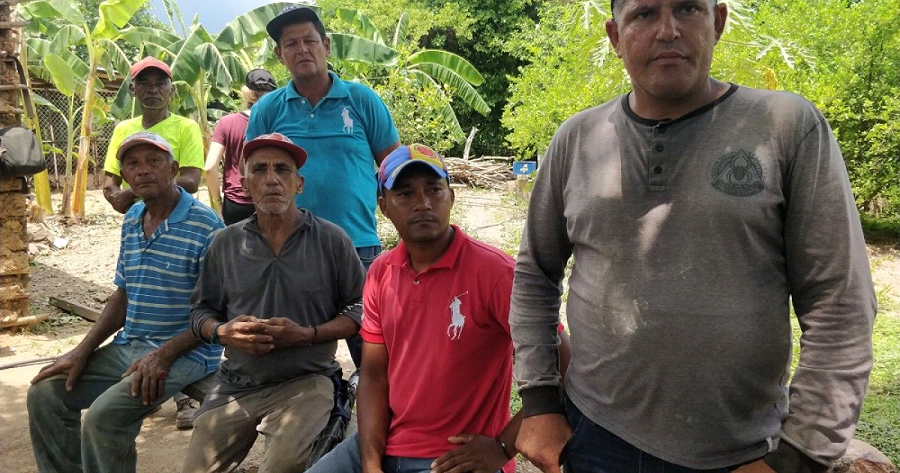QUEBRACHAL, Colombia, (Thomson Reuters Foundation) – Pigs, papayas and peppers are helping seal the peace in Colombia as villagers return to the land after decades of war.
Eighteen years ago, armed men stormed Henry Brito’s village in lush, northern Colombia and forced everyone to flee with only a grab of belongings for comfort.
In 2012, Luis Amaya abandoned his pigs, driven out by days of relentless gunfire.
Two years later, Sofia Fernandez fled home in the dead of night, capitalising on a brief lull in fighting between the warring forces who had foisted her farm into the crossfire.
Three years ago, they all moved back.
And now the remote hills and valleys in the shadow of the Serrania del Perija mountain range, which straddles the northern border between Colombia and Venezuela, are a hub of small, community farm businesses that are pivotal to the new peace.
Exile had not suited all those who fled.
“We are people used to living in the country. We don’t like cities. It’s another world. So we decided to return, even if we have to face a lot of troubles,” Fernandez said.
A 2016 peace deal between the government and Revolutionary Armed Forces of Colombia (FARC) rebels after half a century of fighting encouraged their return, they said, but the going was initially tough and safety far from a given.
They are now hoping that ambitious, government-led development plans – drawn up under the peace deal to support millions like them – would provide a secure future.
Initial signs are encouraging, they said.
PAPAYA, PEPPER, PIG
Under the flagship plans – known as PDETs – Fernandez and her sister now produce 1,000 free-range eggs a day, selling to supermarkets in Fonseca, a bustling town about 20 km away.
Amaya and three other villagers have set up an association to breed and sell pigs.
Brito was one of six fruit farmers who banded together to sell papayas and peppers on a commercial scale, each working an acre of land.
It is old-fashioned farming transported to a new age.
For experts in the field say it could be a model for other countries recovering from long-running conflicts, helping cement peace by reducing deep-seated inequalities and rebuilding regions that were ransacked by war.
The projects target remote, rural people and help them get back to normal life through small, cheap programmes.
Two United Nations agencies – the World Food Programme (WFP) and the Food and Agriculture Organization (FAO) – helped the farmers during the first, tricky 18 months, providing aid and advice while chicken coops and pig pens took shape.
“We used to struggle a lot when we were doing this on our own,” recalled Brito, 60, surrounded by his 400 papaya trees. “First struggle was to find the seeds, tools and nutrients for the soil because we don’t have enough money.”
So the FAO gave seeds, taught them how to turn manure into fertiliser and to plant in stages so they had a crop year-round.
Income is now more stable, said Brito, since the association – it has grown from six to 55 – had paved the way for a contract, with wholesalers agreeing to buy all their produce.
WAR AND PEACE
Colombia’s 52-year war killed about 200,000 people and forced more than 7 million from their homes, according to the United Nations. Rural reforms are now critical to develop areas that were neglected during conflict, political analysts say.
“Only by addressing the deep socio-economic disparities that grip these communities can Colom-bia truly move past the legacy of violence,” according to the Inter-national Crisis Group, a think-tank focused on conflict resolution.
The 10-year programme covers some of the areas worst hit by war, said the government’s Territory Renewal Agency (ART), which is spearheading the efforts.
At the end of May, 37 agribusinesses under PDET employed nearly 3,400 producers, with sales topping 11 billion pesos ($3.4 million), Johana Talina Lugo Rosero, an ART official, told the Thomson Reuters Foundation by email.
Yet this is just a drop in the bucket, and big challenges persist, not least the continued unequal division of land – a key reason why FARC first took up arms.
Many farmers lack titles to their land, making it hard to win credit and state incentives, Talina Lugo Rosero said.
Scant resources also mean poor infrastructure, said Manuela Angel Gonzalez, FAO’s assistant representative in Colombia.
“Another challenge has been trust because these communities have not seen the presence of the government,” she added.
Security also remains fragile in parts of the country. Government estimates that violence had displaced about 210,000 Colombians since the peace deal.
An internal military report said thousands of former rebels had taken up arms again, frustrated over a lack of economic chances and at confronting such stigma and violence.
In the hills around the small town of Quebrachal, however, “peace and quiet is reigning”, said Amaya, 41, who has big plans for the 44 pigs he raises with three fellow farmers.
They want to make their first sale in August.
In a U.N.-backed innovation, the animals sleep on rice husks that break down faecal matter and thus keep the pen clean, eliminating the stench and flies that feature in any piggery.
The Fernandez sisters collect 1,000 eggs a day laid by their “happy hens”, named for their relaxed disposition.
They started out with a gift of 150 chickens from the FAO. They now have seven times as many – and big plans to expand.
“This project has opened a new way of life,” said Fernandez, whose family used to plant yucca, corn and tomatoes.
“We cannot say that we earn a lot of money but it’s enough to have a good life. It gave us a reason to stay on this land.”










